Listen:
Scroll down for a transcript, video, how to subscribe, and more
Episode Synopsis:
Welcome to Episode #70 of Habitual Excellence, presented by Value Capture.
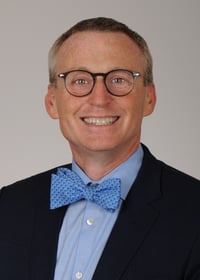
Joining us today as our guest is David Zaas, MD, MBA. He is the chief executive officer for the MUSC Health Charleston Division and the chief clinical officer for MUSC Health.
Dr. David Zaas is a pulmonary and critical care medicine physician with an interest in advanced lung diseases and lung transplantation. Dr. Zaas's research interests have focused on improving outcomes from lung transplantation including the role of infectious complication and organ rejection. Dr. Zaas is also actively engaged in the education of students and graduate trainees as well as a leader in hospital administration.
Dr. Zaas graduated from Yale University in 1994.
He completed his medical degree at Northwestern University in 1998 and did his internship and residency at Johns Hopkins Hospital. He completed his fellowship training at Duke in Pulmonary and Critical Care Medicine in 2005.
He formerly served as medical director for lung transplantation at Duke. Dr. Zaas joined the MUSC faculty in 2020 and he is a professor of medicine at MUSC.
In today's episode, Dr. Zaas talks with host Mark Graban, about topics and questions including:
- If a Lean management system is the solution, let's talk first about the problem statements that make an LMS necessary and helpful… what is the biggest pain point or problem?
- How has that problem statement evolved with Covid?
- The mistake of jumping in - can be compassionate about that...
- “How do we develop trust… absolutely critical…”
- Tips for starting to build trust — can’t just order people to trust you?
- “Wish we had started it earlier…”
- How do you define a Lean management system – what are the major components?
- “Help chain” — tell us more about what that means and how that works…
- “Longstanding commitment to just culture”
- Zero harm as a goal - articulating that in an inspiring way?
- How do you incorporate goals and values around diversity and inclusion? How do you SHOW that you treat everybody with dignity and respect?
- How do the right mindsets, principles, and behaviors influence the actions of leaders in a LMS?
- How does the LMS affect your workforce?
- How does it help develop people?
- What’s your biggest lesson learned about LMS? Something you would have done differently? — evolution and improvement
Click to visit the main Habitual Excellence podcast page.
Video:
Quotes:
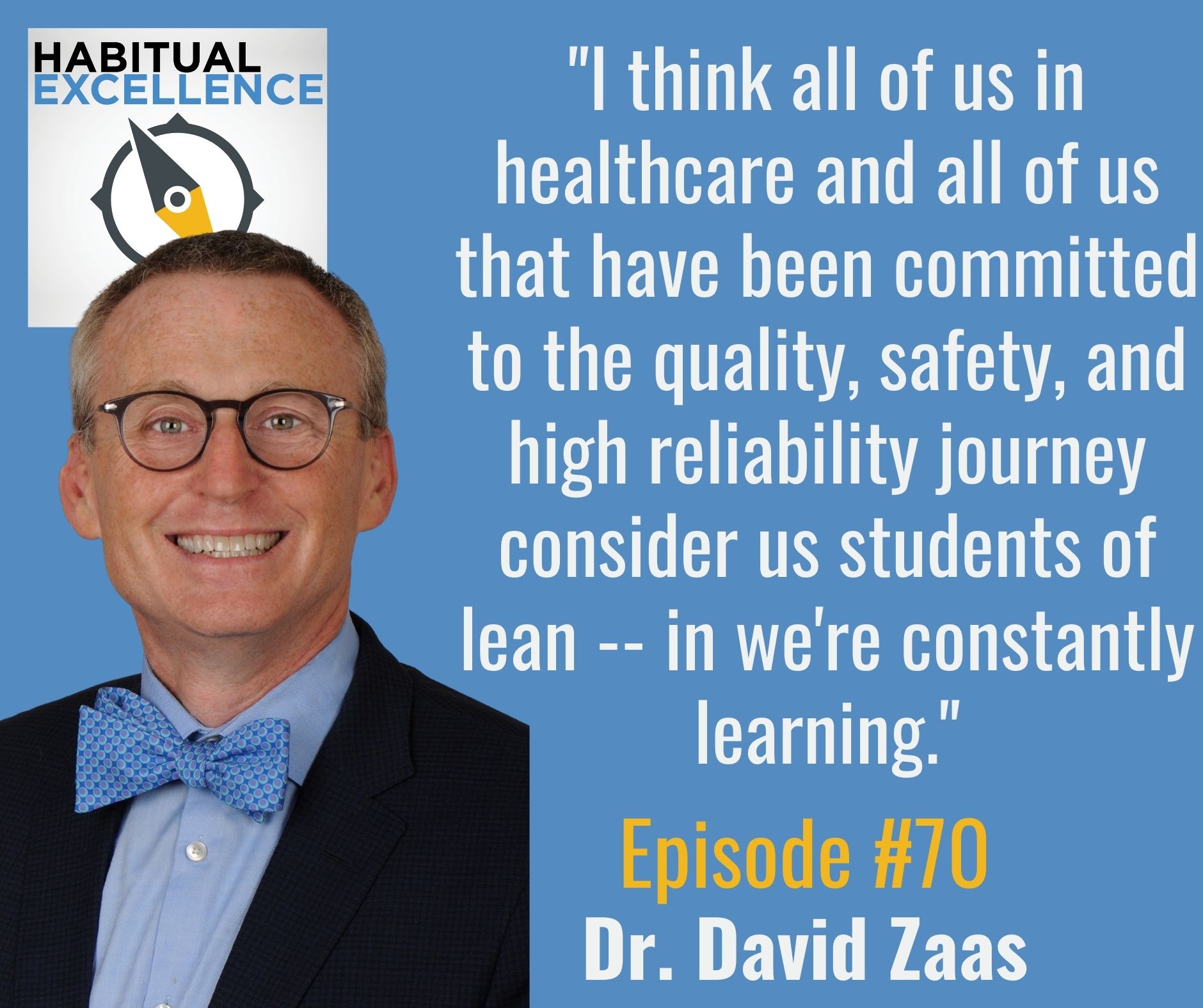
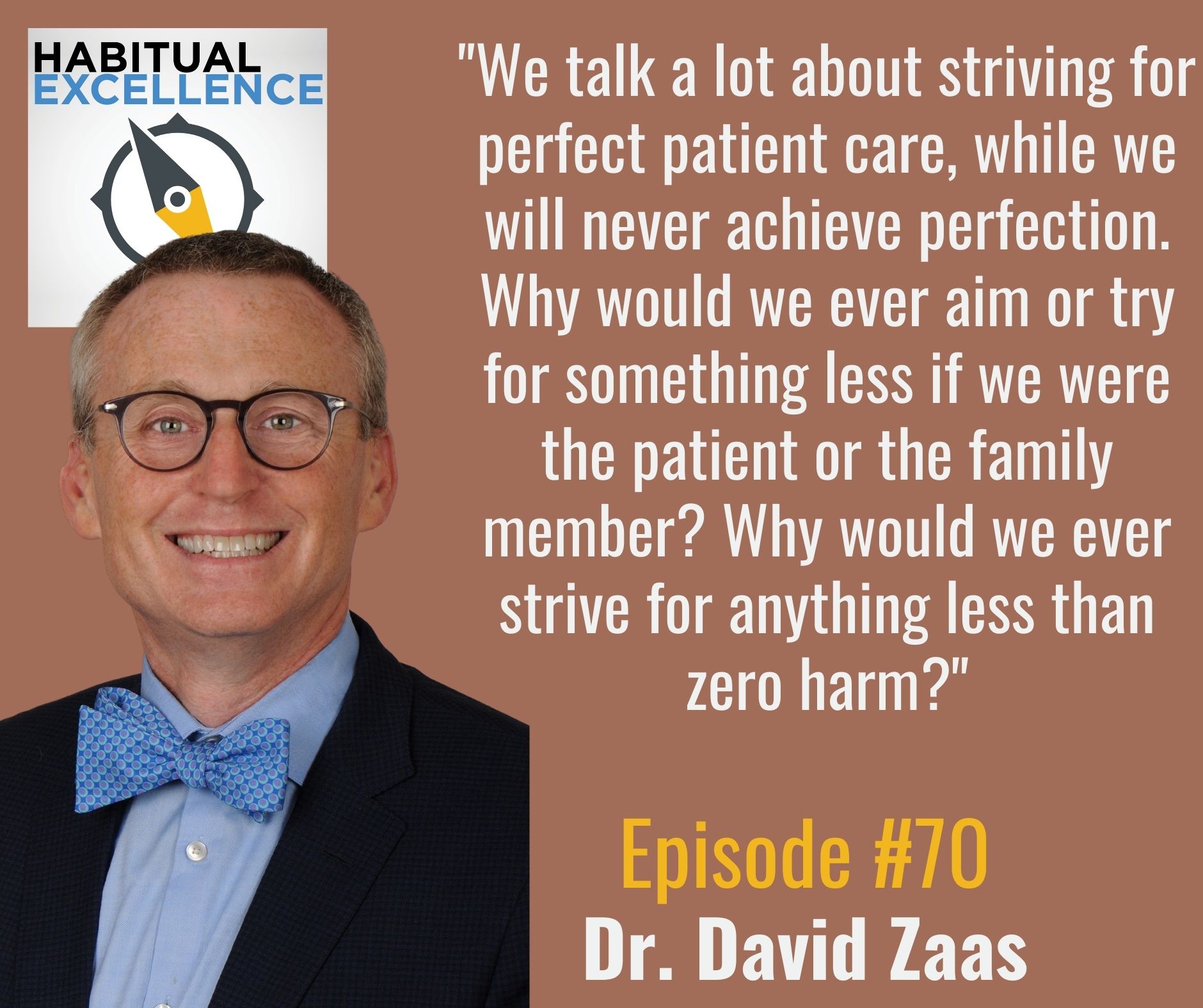
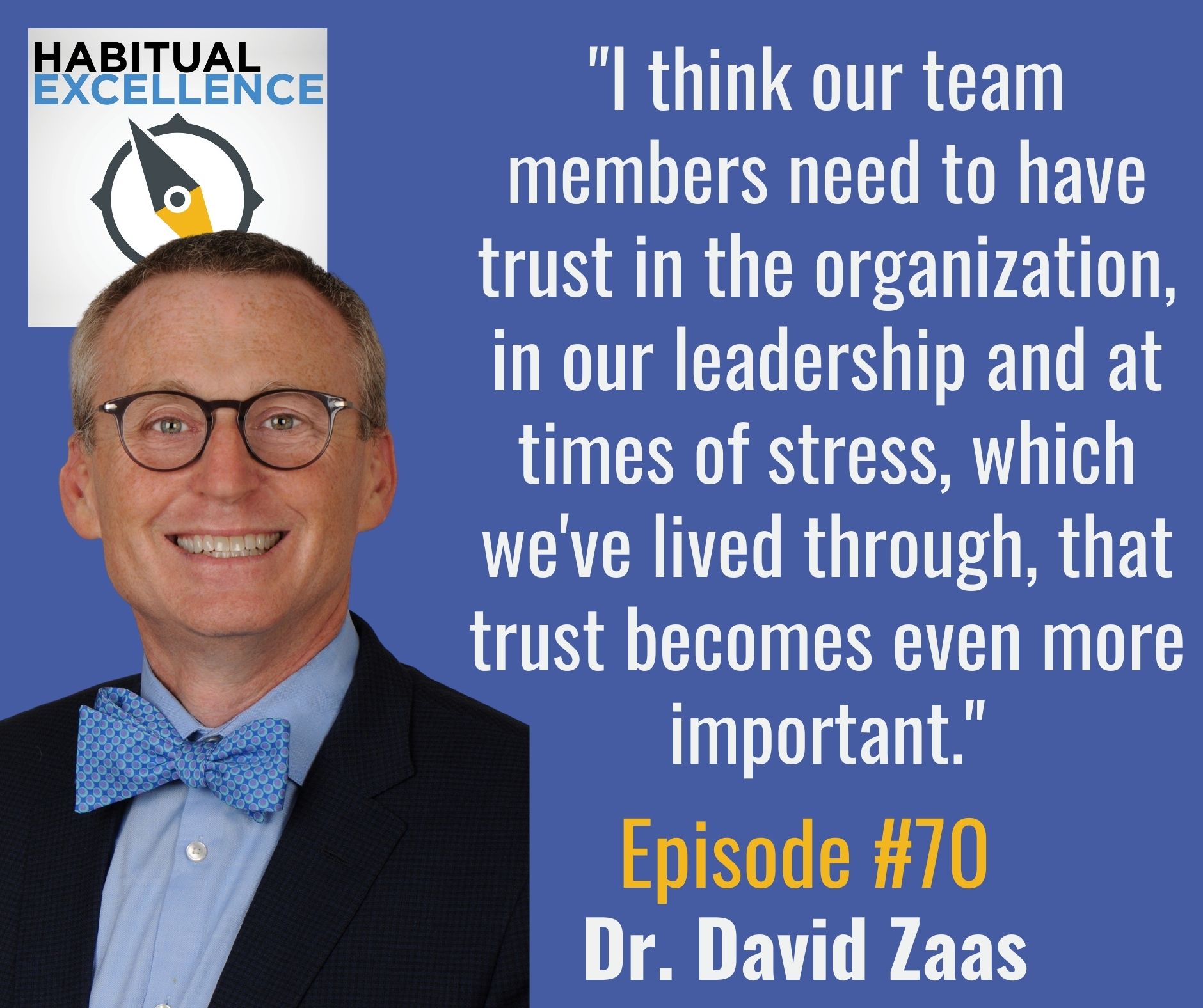
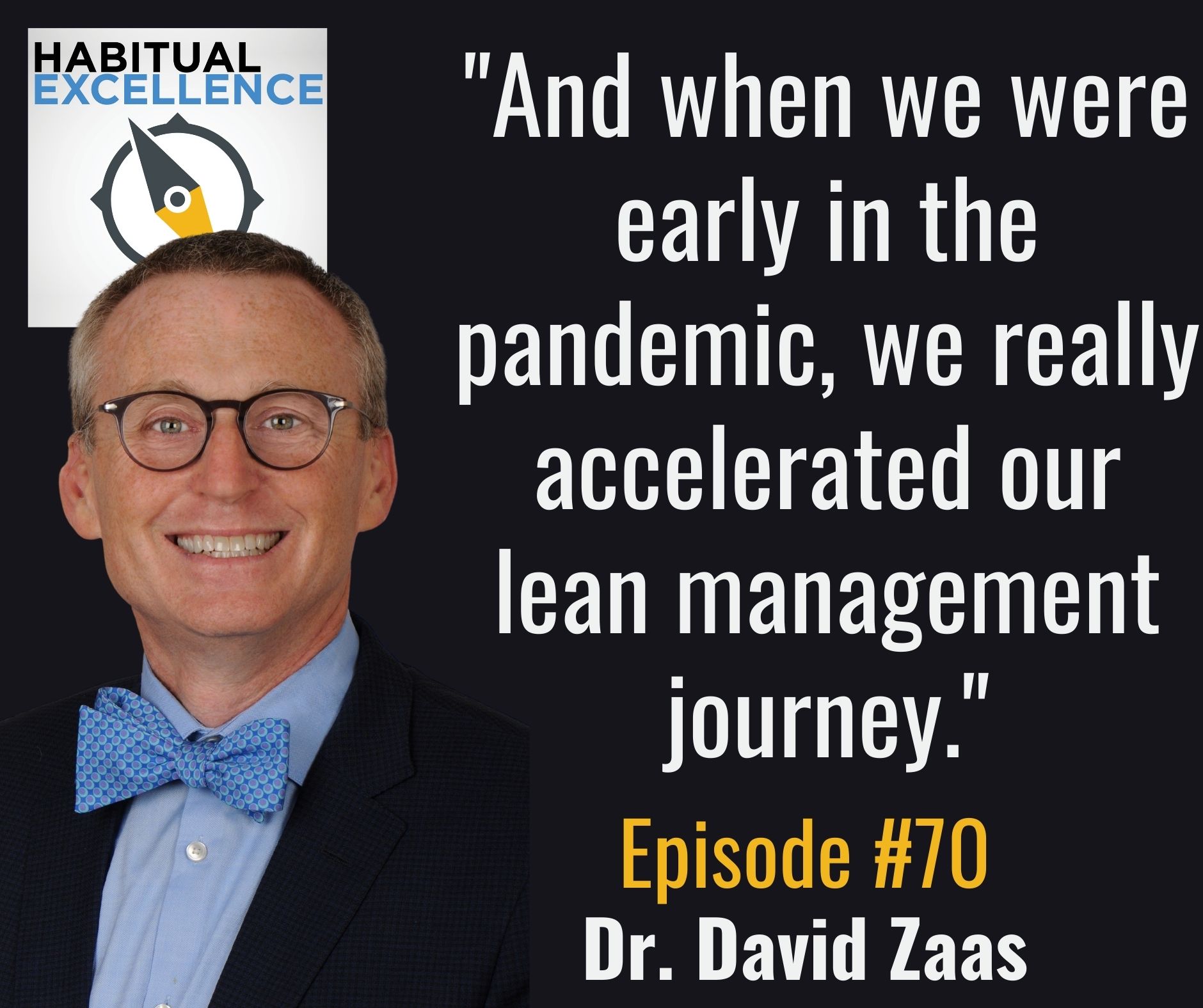
Subscribe:
To make sure you don't miss an episode, be sure to subscribe today! Please rate and review the podcast.
Automated Transcript:
Mark Graban (2s):
Welcome to Habitual Excellence presented by Value Capture. this podcast. And our firm is all about helping you and your organization. Achieve Habitual Excellence. Be a one unifying focus, one value-based structure, and one performance system. In other words, it's about helping you capture dramatically more value through achieving perfect care and perfect safety for patients and staff. To learn more about Value Capture and our services visit www.valuecapturellc.com. Well, hi everybody. Welcome back to Habitual Excellence. I'm Mark Graban from Value Capture and we're joined today.
Mark Graban (42s):
Our guest is Dr. David Zaas. He is the chief executive officer for the MUSC Health Charleston Division, and he's the chief clinical officer for MUSC Health. He's a pulmonary and critical care medicine physician with an interest in advanced lung diseases and lung transplantation. Dr. Zaas's research interests have focused on improving outcomes from lung transplantation, including the role of infectious complication and organ rejection. He is also actively engaged in the edge, engaged in the education of students and graduate trainees as well as being a leader in hospital administration. So before I tell you a little bit more about his background, Dave, thanks for being a guest on the podcast.
Mark Graban (1m 24s):
How are you?
David Zaas (1m 25s):
I'm doing great, Nark. Thank you for having me. I'm really excited to be here.
Mark Graban (1m 29s):
Yeah, well, it's a great opportunity to hear your thoughts and to learn from me today. So before jumping into that, let me share a little bit more about Dr. Zaas. His background. He graduated from Yale University in 1994. He completed his medical degree at Northwestern University in 1998 and did his internship and residency at Johns Hopkins Hospital. He completed his fellowship training at Duke and pulmonary and critical care medicine in 2005, formerly serving then as medical director for lung transplantation at Duke. And then he joined the MUSC faculty in 2020 and is a professor of medicine again at MUSC.
Mark Graban (2m 9s):
So, you know, we're gonna talk a lot today about lean management systems, something you've been involved in, you know, for a while, you know, if, if some of us would frame lean management systems as a solution, maybe we can first talk about some of the problem statements that might make a lean management system necessary and helpful. How would you define the problem statement? Like what are the biggest pain points that, that you see and have seen?
David Zaas (2m 37s):
No, thank you, mark. I think all of us in healthcare and all of us that have been committed to the quality and safety and high reliability journey consider us students of lean in we're constantly learning. And I think the question of the problem statement for me has really evolved over the last several years. And it really started with the commitment to zero harm, the commitment to our people, to building our teams and honestly, being frustrated that we weren't achieving the sustainable excellence that I knew we were capable of.
David Zaas (3m 22s):
And over time as I've matured in my learnings, I realized that, you know, the problem statement to your question that we're trying to solve, how do we best support our people? How do we ensure that all of our amazing team members in health care have the ability to thrive in that role that they serve and what is our role as leaders to support them? So that's the really the passion and problem statement that motivates me.
Mark Graban (3m 52s):
Yeah. How, how has that problem statement changed or evolved in the last couple of years with COVID and all of the different pressures for patient care pressures on care providers?
David Zaas (4m 7s):
I think it's become even more of a burning platform. It's become more important for all of us to understand, right throughout the pandemic, we quickly headed to go from just the mindset of emergency management and we are really good at emergency management, but we realized this wasn't a 24- to 48-hour emergency. This wasn't a 30-day emergency, right. We're now two years in. And we realized that the importance of building process building teams, the importance of resilience and grit is by far the most important thing we do as leaders and not just putting out the fires, which we got really good at, but really doubling down on that commitment.
David Zaas (4m 59s):
And, and really as leaders staying above the moment to moment, crisis really helps support our teams with what they've needed. So it's been a leadership challenge that I think all of us and I'll healthcare, what is said we would have never imagined.
Mark Graban (5m 14s):
Yeah. So that, that the phrase, you know, staying above it is interesting. I mean, a lot of organizations, a lot of leaders would sort of dive down or swoop in, or, you know, rush to where the proverbial fire or the, the real emergency is how I'm, I'm curious, you know, from, from your standpoint, how do you find the balance between empowering and delegating people at the front lines? What, you know, without being completely disconnected without swooping in to solve it for them? Like how, how do you find that balance?
David Zaas (5m 49s):
So it's a, it's a tough question. And I think we've all learned and hopefully matured over the last two years. I think I would recognize myself that we'd probably made mistakes in the beginning as leaders, that we did jump in and try to solve problems and help our teams, but then needed to reflect that, right. Those problems are going to be best solved locally. And we have amazing compassionate, dedicated care team members that we need to not only empower support, get out of the way at times and remove barriers when needed and the scope of the problem.
David Zaas (6m 32s):
And the challenges were so broad and great that we quickly learned that right? Accessibility communication, removing barriers were absolutely critical, but our teams were coming up with markedly, better solutions than our leaders ever could have as individuals in the, the cycle time. The pace of change and improvement is something I've never seen in over 20 years of leadership. Wow. On the dime, being able to adjust to new protocols, new policies, stand up new services connect outside of our hospital walls.
David Zaas (7m 17s):
So right. Our command center and our leadership engagement was absolutely critical, but most so to be coaches, right. To be coaching our teams, to demonstrating our values and principles, and also empowering them that we had total trust in their ability to really save lives across South Carolina.
Mark Graban (7m 43s):
Yeah. Well, and you talk about being compassionate. We can be compassionate about mistakes, and that includes a, as you said, I think, you know, leadership mistakes, you know, th th th the key, I guess, is practicing what we preach about continuous improvement, right. Recognizing the mistake, reflecting, addressing it. And instead of just continuing to repeat that mistake, if, and when it's recognized, could you, could you share a little bit more about maybe that reflection and improvement process around that mistake as you described it?
David Zaas (8m 18s):
Yeah. I think it's important for all of us to have that humility and that structured reflection as, as part of our leader standard work part of our team standard work, which we've started to develop. I transitioned MUSC in June of '20 as the pandemic was really just starting. And I think the tendency of all leaders, myself included as a new leader in an organization sometimes is to come in and take action, especially in the setting of a, of a crisis.
Mark Graban (8m 56s):
Right.
David Zaas (8m 58s):
And when you don't know the team members, but it was an amazing opportunity to quickly reflect that we weren't going to be successful unless I could really ensure that my goal was to make every member of our team better, that I would empower them, give them a seat at the table to create their voice and allow them with the ability to innovate like they never have before. And it was exhausting and the hours were long for all of them. But I, I said there has never been a time that I've been more proud of that team and a leader.
David Zaas (9m 39s):
And, and sometimes people reflect and say, well, you picked an interesting time to, to move organizations. And I said, you know, it's an honor and a privilege to get a chance to lead an organization at any time, but especially in a time over the last few years throughout the pandemic. And I would hope I no can speak for myself that right. It's been very humbling and inspiring to be able to watch the excellence. We talk a lot about our mission of improving the health of South Carolina and beyond.
David Zaas (10m 20s):
And when I speak with our team members, I say, you know, we've always been very mission-focused organization in the last two years. We have made more progress toward that mission than any time in our 200-year history because of what our team members have done. And that I think is important to reflect on when you're tired, when you're, short-staffed when life is hard to really reflect on the impact that the team has had.
Mark Graban (10m 48s):
So that sounds like an answer to the question of how do you build resilience and grit. It sounds like, what are you hearing saying is reminding that, you know, bringing it back to purpose.
David Zaas (11m 4s):
So I, I think it's maybe I'll start with two or three components. Mark, how do we develop trust in our teams and in our community? And I think that trust is absolutely critical to developing resilience and grit. I think our team members need to have trust in the organization, in our leadership and at times of stress, which we've lived through that trust becomes even more important. But my hypothesis is right. Those organizations and leadership teams that can develop trust in their teams trust in their patients, in their community, right.
David Zaas (11m 50s):
Will achieve excellence. They will, you can demonstrate resilience, can develop grit. And it's important, right? If you break down the components of trust to think about the importance of not only right, the competency and skill of our team, but maybe more importantly, getting back to our values and thinking about integrity and compassion and how we demonstrate that to all of our team members. So we doubled down on leadership, availability, visibility, communication, openness every day.
David Zaas (12m 32s):
And we were really learning things every day. And I think what led to our success and success in a lot of organizations around the country, right, was that ability to foundationally develop trust within your care teams, in order to build their resilience. And the reason I linked those two together is it's right. The resilience is our obligation as employers. It's our obligation as leaders to give our teams the, the ability to develop that.
Mark Graban (13m 6s):
Yeah, no, I mean, I think those connections make a lot of sense. It seems like if people aren't feeling that trust, if they, if they, if they don't trust their leaders, they're not going to speak up about problems. They're not going to ask for help. They're not going to share concerns. And then, you know, that could then maybe lead to, you know, to, to, to burn out. So I think that was it. I'm curious before I ask another question, I'm curious to hear your thoughts or reactions to, to, to that idea. You know, what happens if the trust is not there?
David Zaas (13m 38s):
I think, I think it leads to burnout and turnover and it impacts patient safety and quality and all of our, and we try to connect it back again to our principles, right? The trust comes foundationally right back to respect for people and how we lean on those principles and demonstrate that every day as coaches for these teams, and one thing to, to highlight, we're still early in our journey, right? We're still building our improved 2.0 management system.
David Zaas (14m 22s):
And when we were early in the pandemic, we really accelerated our lean management journey. And some people questioned and said, you know, we can't add additional work to our care team members. Right. They're trying to survive. We can't ask them to start doing something else, but we foundationally believed that actually trying to advance our lean journey at the same time as we were during the pandemic, I'm wish we would have been further along in our journey. I think we would been walking. It was really vital, I think, to our success, to really advance our lean journey at the same time that we were putting out fires and dealing with the immediate crisis, because it brought us back to principles, behaviors, process, communication every day.
Mark Graban (15m 16s):
Yeah. Yeah. Well, that's great to hear, you know, leaning into it, you know, during the pandemic, as opposed to pulling back from the structures and the methods of, of a lean management system. But you know, you focus, you know, I love hearing you talk about principles. Like principles should remain completely solid and consistent regardless of the day or the week or the crisis or a new normal. I mean, it seems like what I hear you saying is holding to principles, builds trust effort. People describe more simply, you know, you build trust by doing what you said you were going to do. Like, all right, well then maybe that's one layer of it.
Mark Graban (15m 57s):
But then it seems like, you know, showing that these, these principles don't bend in challenging times builds trust and, and all sorts of positive connections to your care team.
David Zaas (16m 10s):
I think it's, I think you're right. And I think it's important. I think it's important to say it's more than just doing what you said, it's your, it's your intent in your values. And I really believe that our team members can feel it and we have to demonstrate it. And there's no doubt over the last two years, we've had to reflect and pull ourselves back to principles and behaviors, right? We all have this natural tendency to get caught up in the tools and caught up in actions and our team and our credit. My leadership team has done a good job of pulling me back at times and saying, all right, let's go back to our principles and make sure that we are following those as we move forward and right, as leaders with the crisis around us, how do we role model, right?
David Zaas (17m 7s):
The compassion, the calm, the integrity to support those teams and not jump into the moment.
Mark Graban (17m 18s):
Yeah. So I want to ask you a little bit more about how you would, how you define a lean management system, but first off, can you give a little bit more context? You, you, you say you're early in the lean journey. What was some of the timeframe? Give us a little bit of maybe the high-level history there at MUSC.
David Zaas (17m 36s):
Yeah. So again, several years prior to my arrival, the commitment to quality and safety from the MUSC team, really, I think started this journey and we build the improve management system, our quality coaches, and we had a commitment to our values and mission as an organization that I think goes very deep. And then in all honesty really was what attracted me to, to take a career move and a leap due to the, the commitment to values and mission of the state organization here in South Carolina, at the same point, we hadn't hardwired those behaviors, principles, or all of the lean management tools we recognized in the first few weeks I was here that, you know, we didn't have robust tiered huddles.
David Zaas (18m 38s):
We didn't have a clear health change. We hadn't fully implemented in three problem solving across the organization. And that was when we realized that one important than ever, right? Those basic tools were going to be critical for our success. And we were fortunate enough to recognize early, this was not going to be short-lived. And so our planning and our structured design was we need to build the long-term management system, because this is no longer just an event or a crisis.
David Zaas (19m 18s):
This is going to be how we're going to go in forward. And they have orthosis that if we build this, now it's going to benefit our operations, our organization, the excellent care we provide, right, for decades to come by building it. And we're going to have an urgency now to build it more quickly because of everything going on around us and our leaders to their credit really embraced it. And we didn't, we didn't give it a big brand or a logo or a communications platform. It was, this is how we're going to lead and the tools and resources to support our teams and build that without some of the typical launch of a new initiative, but really built those behaviors, principles, lean process that have helped us.
Mark Graban (20m 18s):
So then remind us the exact phrase you used. Was it management system 2.0 or what it was, it was something like that. You do use some language there, or is that just you informally?
David Zaas (20m 31s):
We used it amongst our leadership team, although there was two things that were made, helped our decisions. One of which is we had embraced the improved management system. Previously, our team members were familiar. It, it was the foundation that really led to a lot of our safety and quality improvements over the prior years. So rather than adding something new, we wanted to build on that foundation, but really hard-wire the behaviors and principles and some foundational lean tools. So we, we called it improved 2.0,
Mark Graban (21m 12s):
Okay.
David Zaas (21m 13s):
Cause we weren't, we weren't pivoting. We weren't going in a different direction. We were building on the foundation that the team had built, but we realized we needed to focus on those principles more. And we needed to make sure that the tools were widespread and we had them developed in leaders and teams. But the core that drives me in this journey, right, is that ability of empowering our teams as problem solvers every day, not just in the pandemic, but every opportunity they have and developing our leaders as coaches and really pushing that down. So we quickly redesigned daily safety huddles.
David Zaas (21m 56s):
We quickly redesigned tiered huddle structure. So we quickly redesigned help chains and problem solving because we needed every care team member, not just our quality safety team to really be the problem solvers across the organization. I'll highlight our facilities team. We talk so much around our clinical care team members that have just been outstanding, but we forget that every member of our organization was impacted our EVS, our facilities, the examples of innovation, of how they do their job in the setting of the pandemic and the challenges were just heroic.
Mark Graban (22m 34s):
Yeah. Yeah. Yeah. And it's, it's great to recognize all of that. And you know, when you talk about doing a 2.0, you know, you're, you're recognizing that whatever happened before, it wasn't all bad, we're gonna just, we're gonna make it better. Which that seems like part of the mindset right there of whether we call it continuous improvement or lean or whatever label or phrase we give to it. So that's, that's great to hear continuously improving the way you're improving care or the way you're the way you're improving processes. That's, that's the way it should be. It seems.
David Zaas (23m 6s):
Yep. And I think we still have a long way to go. I think we recognize right. We need to get to 3.0 4.05 point over the next few years. And that's not just from our team development. That's from my development as a leader, as well as our team of how we continue in that journey and how we learn together.
Mark Graban (23m 27s):
Yeah.
David Zaas (23m 29s):
So
Mark Graban (23m 29s):
Let's dig a little bit more into, you know, some of the components or the practices or the tools, if you will, within the lean management system, you've mentioned a couple already, and we've, we've talked to some other guests previously on the podcast about things like daily, tiered huddles and eighty-three problem solving and help chains. I'd like to hear a little bit more from you about the help chain and how that works, but are there other major components within the lean management system that you haven't, that you haven't brought up yet?
David Zaas (24m 3s):
So I'm sure there is, but I'm trying to think around what's best for your, for your audience mark here, as we're trying to focus on this, when I would highlight really is the, the focus in each of our areas is truly our people. And I foundationally believe that we are building these tools to support our people and that we have amazing team members. And if we give them the skills, if we lead by example, right, the outstanding results follow, and I'll use an example, maybe through our evolution of safety huddles.
David Zaas (24m 48s):
And again, we had a commitment of five days a week, leadership engagement in safety huddles, but it was leaders going to the frontline to solve their problems. It was leaders receiving a list of problems from team members to go fix. And we've evolved to really empower those team members to not only recognize the great work that they're doing and their team members to share their successes and where they've hit barriers. And I look over the journey of the pandemic and despite the staffing challenges and stress, the engagement, the feedback about cultural change within the organization.
David Zaas (25m 36s):
When I look at my experience at duke and some great teachers and mentors on my own lean journey and here the most profound impact I see that maybe we don't talk about enough is the impact on culture, right? We talk about, we can reduce harm is 50%. Can we talk about eliminating waste and the financial impact for me, what's most exciting is the impact on our people and how we create culture through building these tools. And I hope all of us that are listening and all of our leaders believe right. That if you can really create a healthy culture, that really gives everyone the opportunity to thrive and being intentional in that word, that everyone needs the opportunity to thrive.
David Zaas (26m 26s):
And how do we use our lean tools to create culture is the critical success factor.
Mark Graban (26m 33s):
I mean, it seems like it all goes hand in hand where let's say focusing on people is a mindset in a principle. And then there are behaviors that come out of that. It seems like there's a lot of, you know, yin and yang or chicken and egg here where you don't just snap your fingers and change the culture. You've got to do some things and practice and be coached and improve. And that starts becoming the culture. It seems like focusing on developing the culture then leads to improvements and other outcomes, right? We have a better culture, which includes people being engaged workforce and people hopefully being happier, which means they're participating in improvements.
Mark Graban (27m 18s):
And that, that, that drives better outcomes then as a result and, and probably then leads to people wanting to stay reducing turnover. We've heard so many stories about that. Am I? It seems like there, there become a virtuous cycles. If you will. These connections between tools, culture, principles, it's, it's all, it's, it seems interconnected the way you talk about it and the way I've seen from others,
David Zaas (27m 44s):
I think it is. And I think it'd be an interesting reflection to say, does that help determine the long-term success and sustainability? I think we can easily learn the tools and the techniques, what will allow them to sustain them to be embraced and to really drive, you know, sustained excellence is that importance of the focus on, again, principles, behaviors, culture that we create. And I think sometimes we forget that. I think in all of our journey, I think sometimes we focus on the shiny objects.
David Zaas (28m 24s):
We focus on the tools and, and, and I love the tools, but realizing the impact. And I reflect on where we are as a team now, compared to two years ago. And I can feel the difference. You can hear the language you can, of how team members and leaders are thinking and processing. And we're really early again, where we're nowhere near where we need to be, but what excites me and what I'm proud of is to hear and feel the difference of how we approach those challenges every day that we see and that we really embrace it.
David Zaas (29m 13s):
One of my favorite coaches are, you know, well, taught me something early in my journey about, you know, finding these problems and others are treasures. And I laughed a lot when I treasures because I was like, I got a whole treasure chest, right? That's creating the culture of leaders and teams, right? The ability to see problems as treasurers and embracing the opportunity to solve it together and that pride and working on it together, that's more important than what the visual management board looks like and how neat their huddles are and others in terms of driving the impact.
Mark Graban (29m 55s):
Yeah. Yeah. It's, it's, it's very well said. I wanted to have all the different things I could ask you. Let me, let me go back to the help chain thing for a minute. Can you talk a little bit about how that works within the context of the tiered huddles and what information does flow upward? What calls for help do flow up orders should flow upward within your context.
David Zaas (30m 27s):
Yeah, no, a lot that I can share there, again, as I said, our really arterial structure didn't exist. We sort of were missing the lowest level and we're missing the highest level as soon as we started. And we're a new health system we're rapidly growing and we've integrated eight community hospitals. So we, at the same time, as we were doing this, had to realize we needed to bring into our chain and our Jared huddles, right? Not just our four hospitals in Charleston, but our eight other hospitals around the state of South Carolina. So the first component that we built was really, again, standardizing how those frontline teams huddled, but at the same time, senior leadership committed, right.
David Zaas (31m 18s):
We were huddling daily focused around safety, senior leaders from across the system. And really them's, what do we need to know to have each of those be able to be appropriately as cascaded? And I think it's important that for us, we've been really emphasized that key skaters by direction, right then, especially during the pandemic, right? Our tiered models were not only valuable for me as a leader to understand, you know, needs barriers, problems, challenges, but huddles were equally important for us to cascade dynamic information that was changing every day.
David Zaas (31m 58s):
And we need to live those values and behaviors from our teams, right. That we were present. But we're also now having to do this virtually and having to try to build tiered huddles and lean management systems in person in my prior life. And now trying to do it virtually are very, very different challenges. And we had to be innovative and creative of how to do it. We also, as part of we've had a longstanding commitment to just culture and, and focus and teams here. One thing that we quickly realized that I think this plagues healthcare in general is sometimes raising the health is viewed as a sign of weakness.
David Zaas (32m 43s):
And there was a perception from team members that, you know, trying to fix it on their own. And we had to go through a few iterations and then it's still, I think on this journey of how do we really create a culture that the using the help chain is not a sign of weakness. It's a critical safety element. So team members are aware of challenges, right? That impact others and how we really map that out. But we're all high achievers. Our team members don't want to disappoint us. And we had to address as I think many organizations have said, know, you can map out the help chain, but if you can change the culture about why we're using now obtain that it's not a sign of weakness, that it's a part of teamwork.
David Zaas (33m 36s):
And again, going back to our values and behaviors, right, that living that was absolutely essential. And I think right, we had to go back and we realized, why are we not hearing things through our genitals and chain? And it wasn't that our team members didn't care or weren't working on everything we were doing. It was really having that culture impact of why change is so important and why we want to rely on our tiered huddles to support them and the outstanding patient care they deliver.
Mark Graban (34m 15s):
So Dave, maybe one final topic here, kind of thinking about the intersection of, of goals and principles and a couple of really important areas. So first off you mentioned earlier zero harm as a goal, focusing on the methods and the culture that would help you get there for the, for the benefit of patients and for staff. I'm glad you mentioned just culture, cause that's an important piece of it there, you know, showing respect and not blaming people for systemic problems. So I, I want to ask you maybe to elaborate a little bit on, on using that goal of zero harm in a way that's inspiring because you know, the, there there's a common pushback.
Mark Graban (34m 58s):
People will say, well, that's a journey or a zero is not possible, or it's discouraging. They said, we're going to get to zero. And we haven't gotten there yet. Like how do you make that kind of a positive aspiration that, that, that keeps people working at it?
David Zaas (35m 16s):
Yeah. So I, it's a great question that has come up as we really started this journey, but I think it's important to strive for those, you know, infinite goals that we will never achieve. And we talk a lot about striving for perfect patient care while we will never achieve perfection. Right. Why would we ever aim or try for something less if we were the patient or the family member, right? Why would we ever strive for anything less than zero harm? If we think around the workplace injuries and workplace violence, that's really increased post the pandemic, right?
David Zaas (36m 4s):
We need to strive for zero harm and perfect patient care every day. And I think it gets to that importance of building trust with your care team members explaining why striving for those goals that are always just out of reach is what our patients, families and our team members would expect every day. And how do we make that inspiration? That's not disappointing when we don't get there, right? It's but we're getting closer every day and we're going to learn from every time we come up short and if our goal and our commitment to the residents of South Carolina and to all of our team members, then that needs to be that, that aspirational goals.
David Zaas (36m 54s):
I try to incorporate it into my language and my newsletters. We define harm very broadly, right harm. Isn't just our hospital acquired infections, right arm. Each one of us, every of our areas can identify, right? What are those harms that we want to eliminate? Whether it's a hospital, bloodstream infection, whether it's too long of a wait for an appointment, whether it's sending you the wrong bill, whether it's an employee, right. That gets the wrong paycheck because we don't have our internal processes, correct. Right. Every day, striving for perfect patient care or striving for zero harm.
David Zaas (37m 38s):
I think if we, again, go back to our principles and our behaviors to our teams is really inspirational to me, but I think it's, again, we need to be storytellers and we've had to be storytellers probably more during the last two years than we ever had throughout our leadership career. And I think this is important part of the story. I worry when people say that zero harm and perfect patient care, aren't inspirational, then we really need to be thinking differently and focusing on telling our stories of why there is nothing more inspirational than perfect patient care.
Mark Graban (38m 19s):
Yeah. Yeah. And, and I agree, I like, to me, it's inspiring. And, and I think it comes back to the issues you've raised already around culture and trust. And one organization leaders might throw the phrase zero harm around, but staff feel like, well, you're blaming us. You're punishing instead of working together to create the conditions and the processes and the mistake proofing and all the things that we would do to significantly reduce errors that lead to harm and making it psychologically safe for people to speak up about risks and near misses so that we can fix things and get closer to zero harm.
David Zaas (38m 60s):
Yep. And more important than ever. I mean, I think zero harm to each other, to our own care team members is more important now than any time in my career, both from what they went through during the pandemic and threats to their own health and safety of their family, to the workplace violence that we see today. So I think the zero harm commitment for us again, is both to our people and to our patients. And in many ways, focusing on zero harm to each other a is absolutely foundational.
Mark Graban (39m 44s):
Yeah. Yeah. And so then the final goal and value that I wanted to ask you about when you talk about staff, you talk about harm and there's a focus on preventing physical harm of course, but then, you know, different types of, I don't know if you will emotional harm or mistreatment or inequity you, how do you incorporate goals and values when it comes to diversity and inclusion in terms of as Paulo Neil always stated at making sure everyone's treated with dignity and respect in every interaction with every person every day, how do you define that?
David Zaas (40m 24s):
So that's an exceptionally important question over the last two years, when we look at the impact of not only the pandemic and health equity and health disparities for vulnerable populations, after many of the murders of George Floyd and others, the systemic racism that we've seen in our society, that, that commitment to our values and behaviors and principles applies equally well, or maybe even more importantly to how we handle diversity equity inclusion, and it's important day in every health system.
David Zaas (41m 12s):
And it's clearly very important here in South Carolina with a lot of our history and challenges in the past. Right? Part of that I I'll go back to earlier is focusing on our humility. I know after the murder of George Floyd was soon after my rival and that humility, that ability to listen and learn, to understand the pain and the impact on our community to see the challenges that we've had over the last two years and as leaders to show our commitment, to realizing that we are, as we strive for perfect patient care, right.
David Zaas (42m 6s):
We're also striving for health equity. We're also striving for, as I mentioned earlier, that ability to have an opportunity for everyone to thrive. The only way that everyone can thrive in our community, right, is really embracing our diverse only way that our team can really achieve excellent sustainable results is through valuing our differences and our perspectives and ensure that we are high performing teams and able to create that sense of inclusion. I think it's been a really hard two years for our team members, not just from COVID, but from the challenges in the world around them, but for leaders.
David Zaas (42m 54s):
And I will speak for my, myself and our team. It's important that we put those issues on the table, that we have those discussion and that we really learn from our team members. And we still have a long way to go. I mentioned earlier, we're early in our lean journey, right? We have a long way to go in our journey towards health equity, true diversity and inclusion on elimination of racism, but that commitment to achieve that goal and the humility to embrace it and to embrace our shortcomings, but to strive for perfection.
Mark Graban (43m 36s):
Right. Well, thank you for, you know, aiming for, you know, is as you, as you called it, you know, infinite levels of performance, whether that's a hundred percent or zero, you know, Paulo, Neil would use the phrase, you know, theoretical limits as a, you know, aspirational, inspirational goal backed up by the culture and the mindsets and the behaviors that, that you've told us about here today. Dave, so thank you for, for all of that for focusing on all those important challenges, thank you for bringing up health equity from a patient perspective and a community perspective as well.
Mark Graban (44m 18s):
Thank you for connecting the dots on all of that.
David Zaas (44m 22s):
Yeah. Thank you for the opportunity. And I really enjoyed the conversation, so I appreciate it mark, and appreciate all that you do
Mark Graban (44m 29s):
Well, thank you. And, you know, thank you for sharing everything that you did today, and I know it's going to be really helpful for, for the people listening. So again, our guest today has been Dr. David Zaas, he's the CEO for the MUSC Health Charleston Division, and he's chief clinical officer for MUSC Health. Again, thank you so much. And look forward to talking to you again, sometime, keep up and keep it up with the journey. Thank you. Thanks for listening to Habitual Excellence presented by Value Capture. We hope you'll subscribe to the podcast and please also rate and review it in your favorite podcast, directory or app to learn more about Value Capture and how we can help your organization on this journey to Habitual Excellence, visit our website www.valuecapturellc.com.
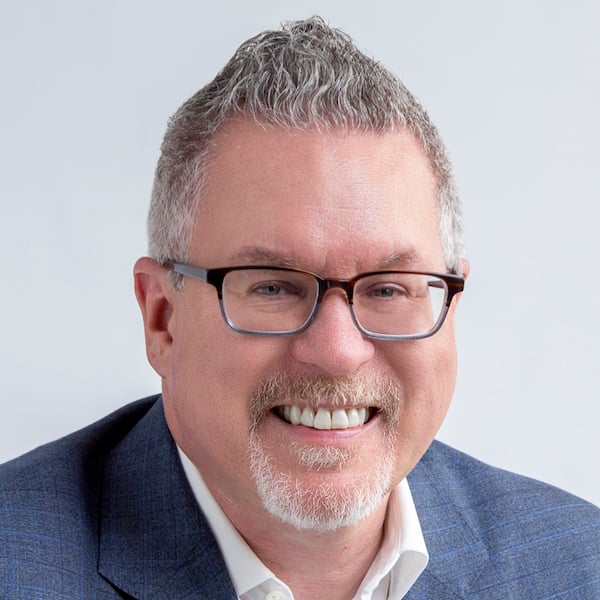
Written by Mark Graban
Mark Graban has served healthcare clients since 2005. Mark is internationally recognized as a leading author and speaker on Lean healthcare. His latest book is "The Mistakes That Make Us: Cultivating a Culture of Learning and Innovation."
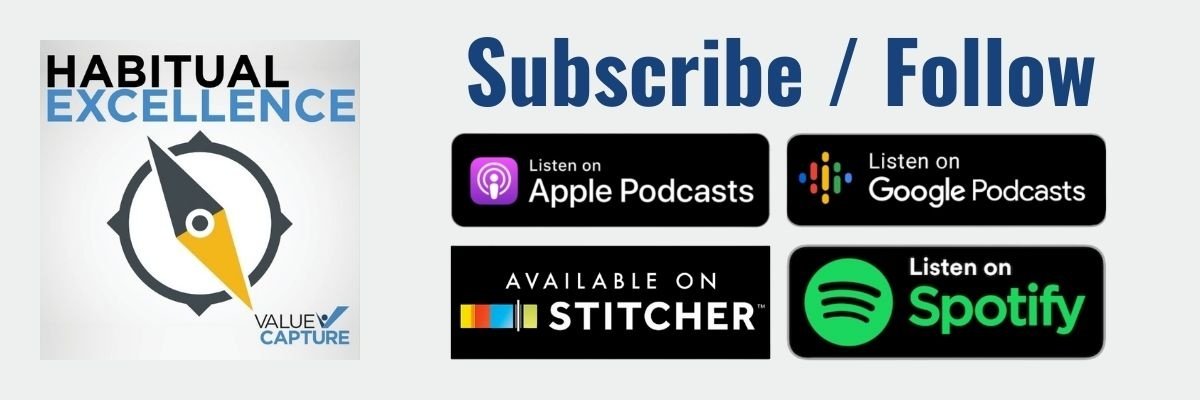
Submit a comment